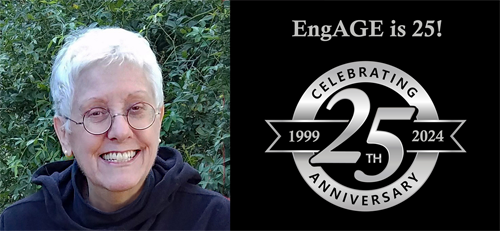Thanks to EngAGE Websites & Social Media Manager Cynthia Friedlob for #MakingADifference and sharing this personal story. Cynthia has been with EngAGE since 2007 when she began providing commentaries to Experience Talks, our public radio show formerly on KPFK-FM, Los Angeles, and other Pacifica Network stations. She enjoys keeping EngAGE in the public eye by sharing information about EngAGE programming and photos of participating residents at our communities. She also shares inspiring news stories and information of general interest to older people.

Cynthia noticed that many news stories promoting “positive aging” were about extraordinary people doing extraordinary things, usually involving exceptional physical prowess and often an element of risk. These definitely were not the stories of the everyday people who are aging positively in our EngAGE communities! This prompted her to write a 2021 blog post advocating skipping the bucket list of extreme adventures and appreciating the joys of the creative, smaller life close to home.
A version of this blog post was subsequently published by NextAvenue. Cynthia followed up with an “interactive journal” in which she shared memories of her smaller life growing up and mused about the creative activities that make it satisfying for her today.
In Praise of the Smaller Life
You’ve seen the articles. At age 73, South African heart surgeon Otto Thaning became the oldest man to swim the English Channel. At age 80, Japanese mountaineer Yuichiro Miura became the oldest person to climb Mt. Everest. And just last month, aviation pioneer Wally Funk, 80 years old, became the oldest woman to fly in space.
These are extraordinary achievements by extraordinary people. They also fit the popular cultural narrative: no matter how old you are, you’re not really living unless you stretch yourself to your limits. We live in a society obsessed by doing more, doing it faster, doing it to the fullest. Lean in, push the envelope, step outside your comfort zone. Go big or go home.
This kind of thinking usually leads to the creation of a bucket list made up of all things exciting and exotic. I have two friends who spent a month rafting 540 miles of the Blue Nile River in Ethiopia, then being handlers on the grueling, 1,000 mile Yukon Quest in Alaska. One of them did this to celebrate his 70th birthday.
Well, no, thanks. Not every life well-lived requires such extremes.
For some of us, like me, a smaller life is perfectly fine. All it requires is finding the things that bring you joy and cultivating opportunities to do them regularly. For example, I have an interest in genealogy, and it brings me great joy when I learn something new about my family history. I can get lost online for ages searching for information, and I value every discovery I make.
The smaller life is focused closer to home. I once had a conversation with a well-traveled colleague who pronounced with great certainty that the only way to understand the world was to travel. He was shocked when I disagreed. Not everyone enjoys travel, not everyone can afford it, and it is physically impossible for some. I happen to think that author Jon Winokur got it right when he pointed out that the root for the word “travel” is the same as that for “travail.” I look forward to the invention of the Star Trek transporter so that I can be plunked down in new places without having to endure the process of getting there.
For those who have wanderlust and the ability to fund it, I’m happy to say bon voyage. But some of us are content to be armchair nomads, learning about the world through reading; watching documentaries, foreign television shows and films; and visiting museums and historic locations online.
Those of us fortunate to live in the Los Angeles area can enjoy a taste of other cultures in nearby neighborhoods. You don’t have to go to Japan to celebrate the Cherry Blossom Festival, or to Mexico for Dia de los Muertos, or to China for the Chinese New Year. The experience isn’t the same as being in a foreign country, of course, but it can be satisfying and informative, especially if you talk to some of the locals.
The smaller life doesn’t mean that you have no goals, or you don’t challenge yourself to learn something new. It means that you have an open mind and set your goals realistically, taking on challenges that are manageable for your circumstances. In our EngAGE communities, I see residents who bravely try making art for the first time in their lives, writing a story or poem, singing with a chorus, learning another language, or exercising to regain strength. I understand and appreciate how significant those efforts and achievements are.
My smaller life may not include climbing Machu Picchu, but there’s a beautiful park where I can take a walk that tests my endurance. I won’t be immersing myself in a language learning program in Mexico, but my high school Spanish is getting a workout from a program online. And I don’t need to leave home to have my brain challenged by technology almost daily on my job!
Sometimes the smaller life is imposed upon us. The pandemic made just about everyone rethink venturing out. For many people, including EngAGE community residents, Zoom has provided a valuable connection to others, and an opportunity to learn and discover new interests. Fortunately, the Internet allows a physically limited existence to expand as far as the mind wants to go.
The smaller life is not a lesser life. It can be adventurous in its own way and quite a lot of fun! Most importantly, it can have purpose and meaning. The scaled-down triumphs of the smaller life are no less sweet than the dramatic ones that make the headlines.
It’s not necessary to “go big or go home.” It’s fine to stay small and stay home, enjoying a smaller life.

Slow down, you move too fast,
You got to make the morning last,
Just kicking down the cobblestones,
Looking for fun and feelin’ groovy.
– “The 59th Street Bridge Song” by Paul Simon


